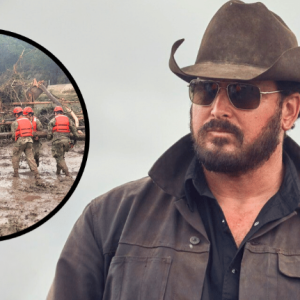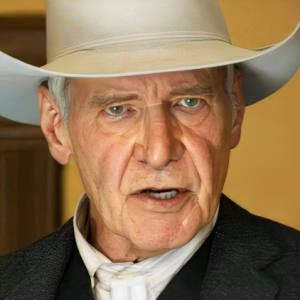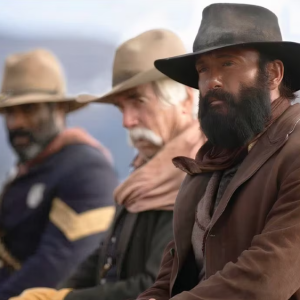Alexandra’s arrival in the United States was meant to be the dawn of a bright, romantic chapter, the final leg of an arduous journey to reunite with Spencer Dutton. Their love, forged amidst the perils of colonial Africa and solidified through a desperate, shipwrecked voyage across continents, had promised her a future of freedom and belonging in the vast, untamed lands of Montana. This was where Spencer’s family, the Duttons, held an unbreakable legacy, fiercely guarding their ranch against encroaching modernity and relentless adversity. Yet, the moment Alexandra set foot on American soil, the legendary land of dreams swiftly revealed itself not as a haven, but as a challenging crucible of unforeseen trials, far more subtle yet equally insidious as the overt dangers she had already faced.
The initial disillusionment struck immediately and without mercy at the immigration checkpoint. Instead of a welcoming embrace into a new life, Alexandra was met with suspicion, scrutiny, and the chilling gaze of an officer whose eyes lingered far too long and whose questions cut deep, laced with thinly veiled condescension and an unsettling familiarity. The palpable humiliation of the situation stung profoundly, but Alexandra’s innate pride, tempered by the extraordinary trials she had already endured alongside Spencer, proved far stronger than any burgeoning fear. She refused to bow her head or compromise her inherent dignity, even as the grim realization dawned that her defiance risked her hard-won entry into the country and, by extension, her long-awaited reunion with Spencer. Rather than shrink under the officer’s predatory attention, Alexandra made an audacious and profoundly defiant choice. She met his gaze directly, her posture unwavering, and began to recite lines from Walt Whitman’s “Song of Myself.” Her voice, though carrying the faint lilt of her English accent, was steady and imbued each word with quiet, resonant power – a poem steeped in themes of freedom, radical self-respect, and the unyielding spirit of the individual. It was a deliberate, pointed message not only to the lecherous officer but to the other observing officials and, perhaps, to the very concept of America itself: she would not be broken, not even here at the initial gates of her new life. This impromptu performance, a stark contrast to the sterile environment of the immigration hall, visibly irritated the officer, a man clearly unaccustomed to such open and articulate challenge to his authority. In that fraught, tense moment, Alexandra knew she was gambling everything – her right to enter the country, her personal safety, and the entirety of her future with Spencer. Yet, the gamble, at least for the present, paid off. After an uncomfortably protracted pause, the officer, perhaps deeming her more trouble than she was worth, waved her through with a brusque gesture. Alexandra walked past the checkpoint, her head held high, yet her heart resonated with the knowledge that this was merely the inaugural battle she would face on complex, often unforgiving American soil.
New York City greeted her with a cacophony of crowded streets, the glittering allure of shop windows, and an overwhelming, almost suffocating scent of industry and ambition. It was a jarring departure from the romanticized vision she had harbored in her mind – a vibrant, raw energy inextricably wrapped in the relentless noise, the pervasive grime, and the sharp, unforgiving edges of survival in the dawn of a new industrial age. Despite the sensory overload and the initial shock, Alexandra wasted no time. Her singular goal remained crystal clear, a beacon guiding her through the urban maze: she had to reach Montana, to the vast, isolated ranch where Spencer, a descendant of the Yellowstone patriarchs, awaited her. She knew little of the ranch’s daily struggles, the brutal drought plaguing the land, or the escalating conflicts with figures like the relentless Banner Creighton, but she understood Spencer’s deep, inherent connection to it, making her journey not just personal, but interwoven with the very fabric of the Dutton legacy and its perpetual fight for survival.

At the sprawling, echoing train station, a hub of human transit and unseen destinies, she clutched the small, precious purse holding her dwindling funds. Approaching the ticket counter, her voice wavered slightly, a tremor of apprehension mingling with fierce determination, as she asked for a one-way ticket to Montana. The sheer, daunting distance alone felt like a monumental leap into the vast unknown, a journey across half a continent into a wilder, more sparsely populated landscape. The clerk, a stoic figure, eyed her elegant but travel-worn foreign dress and listened to her cultured accent, yet said nothing beyond the transaction as he handed over the ticket. Alexandra’s heart pounded with a mix of anticipation and trepidation. Every mile westward would undeniably take her closer to Spencer, closer to the life they had meticulously dreamed about together, a life free from the constraints of their tumultuous pasts.
What Alexandra could not perceive, however, what she was blissfully unaware of amidst her focused determination, was the quiet, unsettling presence of a man just a few paces behind her. He had been watching her since the moment she captivated the immigration hall with her defiance, his gaze not merely curious but sharp and calculating. Something about her — perhaps her striking beauty, her evident vulnerability as a solo female traveler, or the resilient, almost naïve hope in her eyes — had caught his unsettling interest. His clothing was unassuming, plain enough to allow him to blend seamlessly into the bustling crowd of travelers, yet there was an unsettling stillness in the way he moved, an almost predatory quietude that belied his ordinary appearance. He purchased his own ticket with an unnerving lack of fanfare, making sure his destination matched hers, a silent, chilling echo of her own westward ambition.
As Alexandra boarded the train, finding a seat by the window and clutching her bag tightly, she remained entirely oblivious to the insidious shadow that had begun to follow her across the country. She gazed out at the sprawling, receding cityscape of New York, convinced that the hardest part of her journey was behind her. She had, after all, survived the indignities of immigration and the overwhelming chaos of America’s largest city. Now, she was finally, undeniably on her way to Montana, to the protective embrace of Spencer. What she could not comprehend was that her journey, far from being over, had already taken an irrevocably dangerous turn, guided by an unseen hand. The man’s eyes, hidden behind the shifting throngs of passengers, never left her. He maintained his distance for now, a silent, unreadable presence, blending into the rhythmic shuffle and sway of the train car. Was he merely a fellow traveler, a chance encounter with a fleeting, harmless curiosity? Or was he something far more sinister, a predator who had identified in Alexandra not a fellow human being seeking solace, but an opportunity to exploit?

Her truly fatal mistake, though she was still tragically unable to perceive it, was in clinging to the belief that the trials of this new and unpredictable land would always be overt, that its dangers would announce themselves as clearly and aggressively as the immigration officer’s unwanted attention. She had learned to confront obvious threats head-on, but in the sprawling, often ruthless America of 1923, true menace often cloaked itself in plain sight, wearing ordinary faces and moving in silent, patient pursuit until it was far too late for recognition or escape.
Hours into the journey, as the train’s rhythmic clatter and gentle sway began to lull her into a deceptive sense of security, Alexandra allowed herself the luxury of relaxation. The scenery outside her window shifted incrementally, transforming from the industrial outskirts of the city to the nascent sprawl of countryside, a prelude to the vast plains and mountains that awaited her. Her mind drifted, painting vivid, comforting images of Spencer waiting for her in Montana – his familiar, reassuring smile, the comforting strength of his embrace, the promise of a future finally realized. It was this powerful vision of love and belonging, not the lingering cold stares of suspicious strangers, that ultimately kept her courage intact and her spirits from faltering.
Meanwhile, her silent follower, a stark counterpoint to her hopeful reverie, continued to study her every move with chilling precision. At each fleeting stop the train made, he watched intently to see if she would disembark, always ready to adjust his own shadowy plans accordingly. Whatever his veiled intentions – whether opportunism, malice, or something even more complex – one grim certainty became undeniable: Alexandra was no longer merely traveling toward a longed-for reunion. She was, with every passing mile, unknowingly walking straight into a profound test of survival, a challenge that would define the rest of her life.

By the time night finally fell, shrouding the landscape in impenetrable darkness, the dim lamplight inside the train car flickered gently, casting long, dancing shadows that swayed ominously with the movement of the carriage. Alexandra, exhausted by the day’s emotional and physical strain, closed her eyes, allowing herself to succumb to a restless sleep. She remained tragically unaware that her cross-country journey had subtly, insidiously transformed into a silent, desperate race between the undeniable power of love and the insidious creep of danger – a race in which the man trailing her was steadily, relentlessly closing the distance between them.
For now, Alexandra’s weary mind was still primarily filled with hope, a fragile, precious commodity in the turbulent era of 1923. But hope, as she was about to discover, can be an incredibly brittle thing, especially in an untamed, unforgiving America where dreams could be crushed in an instant, often by forces unseen. Whether her ‘fatal mistake’ was simply boarding that train alone, driven by love and urgency, or perhaps trusting the seemingly limitless promise of America too quickly, or even merely letting her guard down after the initial gauntlet of immigration – one thing was chillingly certain: the very moment she finally stepped off that train in the wild heart of Montana, her life, irrevocably intertwined with the Dutton legacy, would never be the same again. And as the miles continued to tick away, carrying her deeper into the vastness of the American West, the real question lingered like a storm on the distant horizon: would Alexandra’s profound courage and unyielding dignity be enough to protect her from the insidious danger already following relentlessly in her shadow?





